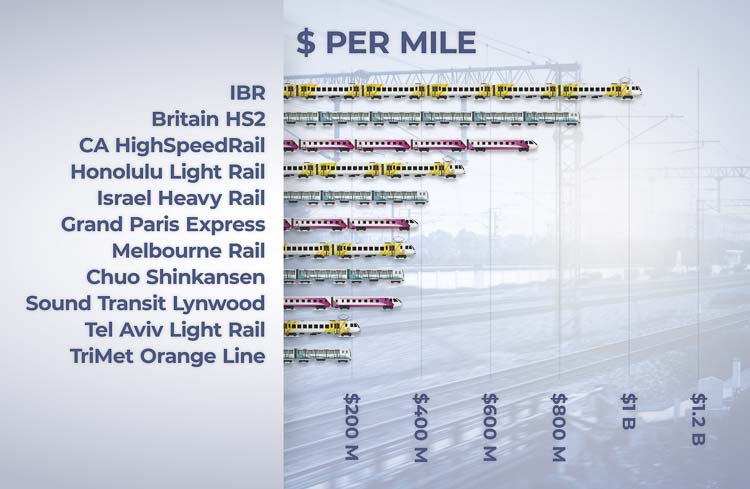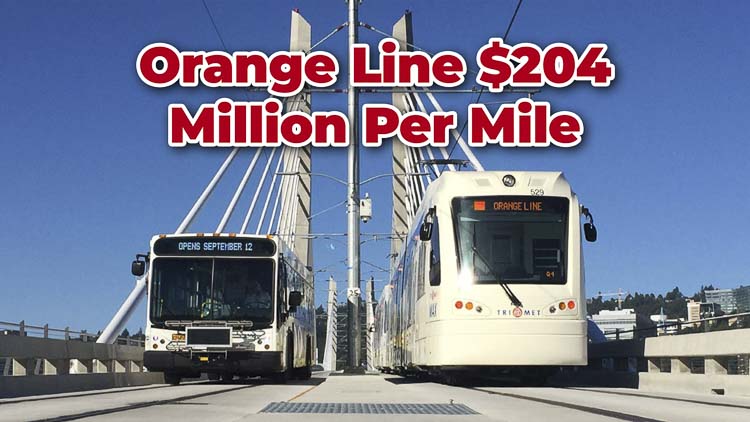
The cost of the proposed 1.9-mile extension of TriMet’s MAX Yellow light rail line into Vancouver is presently close to $2 billion, or $1 billion per mile
John Ley
for Clark County Today
The Interstate Bridge Replacement (IBR) Program is proposing a 1.9-mile extension of TriMet’s MAX Yellow light rail line into Vancouver. The price tag is presently close to $2 billion or $1 billion per mile. Is this the world’s most expensive light rail extension? It’s five times the per mile cost of their Orange Line, which included a new bridge over the Willamette River.
Many Washington residents are aware of Seattle’s $54 billion ST-3 project. It was projected to build 62 miles of light rail, two new Bus Rapid Transit lines, and extend the Sounder commuter rail line. But eight years later, the cost estimate has nearly tripled to $148 billion.
Sound Transit is opening its 8.5-mile, $3 billion Lynnwood Link Light Rail Extension on Labor Day weekend. The cost is $353 million per mile.

A quick trip around the world will offer cost comparisons between light rail, heavy rail, and high speed rail systems.
A recent news report touted seven of the world’s biggest rail megaprojects under construction. At the low end of their list of rail projects was Tel Aviv’s $13 billion light rail system. It consists of three lines totaling 56 miles, or $232 million per mile.
Melbourne, Australia was listed next, spending $19-22 billion on a 56-mile rail network around the city. That equates to $340 million to $393 million per mile.
Israel will build a heavy rail line involving three separate lines running about 93 miles. The price tag is estimated at $40 billion, or $430 million per mile.
The Grand Paris Express is Europe’s largest transport infrastructure project and will double the size of the Paris Métro when it is complete. The price of this is estimated at $48 billion for 120 miles of new heavy rail transportation, or $400 million per mile.
The Chuo Shinkansen project involves building a 177.7-mile high-speed, superconducting maglev rail line between Tokyo and Nagoya in Japan. The price is estimated at $64 billion, or $360 million per mile.
Britain’s second high-speed rail line, HS2, is currently under construction but running over budget and behind schedule. The $122 billion project is 140 miles long, or about $870 million per mile.
The California high-speed rail project connecting Los Angeles with San Francisco is well known as the world’s biggest budget buster. It currently is estimated to cost $128 billion to complete the 171-mile line. If it comes in at that figure, it will cost about $748 million per mile.
Honorable mention also goes to Honolulu’s $10 billion light rail system that has been plagued with cost overruns and delays. The pared-down project will travel 18.6 miles at a cost of about $537 million per mile.
TriMet’s most recent new light rail addition was the Orange Line to Milwaukie. The 7.3-mile line cost $1.49 billion, or $204 million per mile. A new bridge over the Willamette River was included in that cost.
Oregon and Washington taxpayers should question what they are getting for the world’s most expensive light rail project costing $1 billion per mile?
Also read:
- Delays expected on Northwest 99th Street during water quality project constructionClark County will begin construction in July to install a stormwater filter vault on NW 99th Street. Drivers can expect delays, but lanes will remain open during the work.
- POLL: What’s the biggest concern you have with the current I-5 Bridge replacement plan?As costs rise and Oregon’s funding fails, concerns mount over the current I-5 Bridge replacement plan. Clark County Today asks readers: what’s your biggest concern?
- Plan ahead for ramp closures on I-5 near Ridgefield, July 8-9Travelers on northbound I-5 near Ridgefield should prepare for ramp closures July 8–9 as WSDOT crews conduct final testing of new wrong-way driving detection systems. The closures affect exits 9 and 11, including the Gee Creek Rest Area.
- Oregon DOT director calls transportation funding bill failure ‘shocking,’ warns of layoffsODOT Director Kris Strickler warned staff that up to 700 layoffs are imminent after lawmakers failed to pass a transportation funding bill, deepening the agency’s $300 million shortfall.
- New crossing opens over SR 500 in VancouverWSDOT has opened a new pedestrian and bike bridge over SR 500 in Vancouver, restoring direct and ADA-accessible access for people walking, biking, or rolling.









